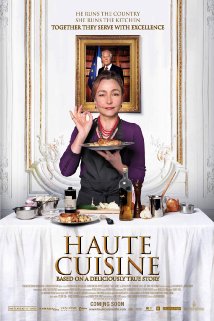Times are tough in her one-woman restaurant and when the offer comes to cook for a senior official in Paris for a couple of years at an incredible salary, Hortense takes the bait. I particularly liked the stunned silence when she is told that Joël Robuchon recommended her. (It is like being recommended by Zeus, a higher being.) Soon enough she realizes she is cooking for the President of France (loosely based on François Mitterand) in the Élysée Palace at 55 rue de Saint Honoré.
Recommended for adults.

There are some insights into the workings of the Building and its many thousands of employees, with some amusing, perhaps alarming scenes for taxpayers, examples of the waste caused by a ten minute delay in a departure for the airport. There is the inevitable tension between different departments within the household.

Hortense’s mission is to cook for the President in a simple way to give him a contrast to the formal, state dinners with their elaborate sauces, etc. Yet she has no way of knowing what the President likes, since she has no access to him, so she examines his plate when it is brought back from the table and infers from that.
The men in the main kitchen, they are all men, resent the existence of this small private kitchen in the residential wing do all they can to undermine it. All too believable. They would do this in any case but that the private cook is an unknown women triples their efforts.
She struggles, not always with success, to limit cost, achieve the highest quality, and stay within the dietary regime of the dying President. Meanwhile, the boys in the main kitchen carp, grudge, cheat, backbite, undermine…
It is great fun, plenty of food to drool over, and I also liked her brief excursion to the Antarctica research station to cook for the crew. There she talked to the diners, learned what they liked, enlisted their help in securing items, and enjoyed it a lot more than than the starched, constrained, combative, zero-tolerance, macho environment at Numero 55. Yes, strange though it may seem the Palace was presented as much more macho than the research station on the edge of the world, which by contrast seemed much more like a family, a large and noisy one to be sure.
While the ‘Tastes of the Palace’ makes perfectly good sense, for reasons unknown the distributor of this film have called it ‘Haute Cuisine’ in English. It is a title at odds with the major theme about food, namely that simple food is best when made from the best available produce. No doubt an advertising agency thought Haute Cuisine would appeal to some regardless of the intellectual coherence of the film.
Skip to content
